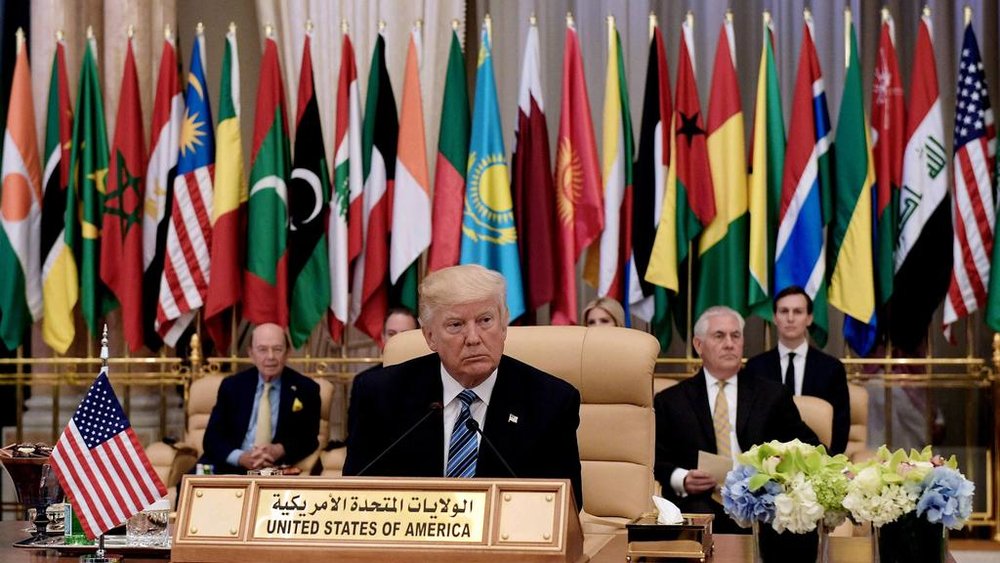Has Trump become a leader of Arab nationalism?

The developments of the crisis with Qatar have revealed the depth of the abyss the entire Arab world is descending into.
New aspects and dimensions are being added to it daily. Since this crisis, which surprised the PGCC, the only fort left of the crumbling Arab system, has gone on for more than three months; it seems that it is heading for more complications and escalations rather than towards resolution. This raises fears of the Arab world growing gradually closer to the moment it hits the bottom of the abyss.
Perhaps the strangest thing revealed by the developments of the crisis over the past week was the emergence of Donald Trump’s role as the puppet master and his keenness to appear as the only person who can find a way out of the crisis. When the Kuwaiti Emir was hosted at the White House, Donald Trump picked up the phone and made several calls to the leaders of the PGCC countries.
Globalization of the crisis
Immediately after the outbreak of the crisis, there was a belief, that was prevalent for some time, that the crisis was purely a Persian Gulf crisis and that looking for a way out of it must remain in the hands of the Persian Gulf states. They had also believed that all of the parties’ interests would be served by making every effort to prevent the globalization of the crisis. This explains the immediate and automatic welcoming of the Kuwaiti mediation by the official and popular level, followed by the official and popular support for all of the Omani diplomatic measures to support the Kuwaiti mediation in order to make sure all of the efforts to resolve the crisis remained within the Persian Gulf house. However, things unfortunately quickly began to take another turn.
Some began to talk about possibilities of resorting to a military solution and in preparation for this possibility, Qatar decided to activate an old joint defense agreement with Turkey. Symbolic Turkish forces began to fly into Doha. The U.S., Russia, and some European countries began to actively interfere in the crisis, and each party tried to steer it in their favor.
Any resolution of the crisis must reflect the international and regional balances of power fighting on the ground.
Despite everyone’s keenness to highlight their support for the Kuwaiti mediation and their conviction that the solution should remain in the hands of the Persian Gulf states, all of the evidence suggested that the crisis had actually been globalized and its resolution had been organically linked to all of the conflicts in the region. Therefore, any resolution of the crisis must reflect the international and regional balances of power fighting on the ground.
No one doubts the fact that Kuwait did everything it could to find a Persian Gulf solution to the crisis, as well as no one doubts that Oman was keen to provide genuine and serious help in this regard. Moreover, the involvement of international and regional parties in the crisis was not a source of new facts as much as it revealed the nature of the crisis as a completely regional and international crisis.
When a crisis this serious breaks out between oil-wealthy countries that have enormous financial reserves, and when this happens at a time when the Arab regional system seems completely naked and unable to preserve its modesty with even a fig leaf, the globalization of such a crisis would not only become extremely easy, but inevitable.
The Kuwaiti Emir headed to the White House in the context of his efforts to resolve the crisis and this act in itself revealed the impossibility of resolving the crisis by any other means than through the U.S. and its effective participation.
However, the manner in which Trump treated the Kuwaiti Emir’s visit sent an implicit message to the concerned parties that the U.S. is keen on some PGCC countries remaining united more than other PGCC countries.
When Trump appears in this manner, he acts like a leader of Arab nationalism who is keen on the unity of the Arabs. This in itself is ironic and expresses the magnitude of the tragedy experienced by the Arab world.
(Source: middleeastmonitor.com)
